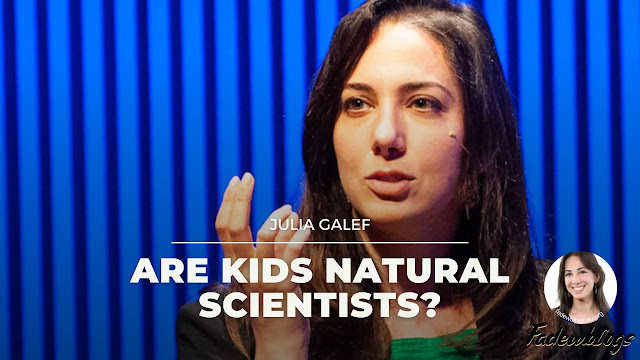Are Children Really Natural Scientists? Do Our School System Harm Their Level of Curiosity?
Today I want to talk about a common trope that I keep hearing in skeptic circles. I've heard it from Neil deGrasse Tyson, I've heard it from Cara Santa Maria, I've heard it or read it from Carl Sagan, and the trope is some version of children are natural scientists.
Usually, this is said (or implied) in contrast to adults who don't have that spirit of scientific inquiry anymore, that they had as children.
Often this claim is packaged with an implication or a claim that our school system beats that love of science, that spirit of scientific inquiry out of children, and that's a large part of why we don't see it in adults.
From the first time I heard this claim, I was instantly suspicious; not because I had any obvious reason why it wasn't true or evidence to the contrary, but because it's the kind of thing that gets repeated because it's "pretty"; not because we have good reasons to believe it.
Do you know what I mean by "pretty?" I mean it sort of fits with a beautiful model of how the world works or how we would like the world to work.
It confirms our sort of preconceptions or values about what's important, and I'm always suspicious of pretty claims.
I started looking into it a little bit just out of curiosity to see what kind of evidence there was for this claim.
So, first off the part of the claim about children being natural scientists in some sense by some interpretations of that claim, that is true.
Children are naturally curious and explore the world more wholesomely than adults in most cases.
I've seen some studies that suggest that children naturally do some simple form of hypothesis testing. So, they'll try a thing like put something off a table see what happens.
And if it's not what they were used to or expected, they experience surprise.
It seems to be a natural part of how they learn about how the world works.
The part of being a scientist that involves checking your own assumptions and controlling for your own bias.
I don't think kids naturally do that. Those are the kinds of habits that you have to just train in yourself to be a good scientist, but that maybe is too strict of an interpretation of what the original claim meant.
So, sure in some sense, children are naturally scientifically curious about the world around them. The part of the claims that are making a causal claim about our schooling system beating that natural love of science out of children, that seems more dubious to me.
It definitely seems to be the case that some form of curiosity and inquiry about the world is universal in human children, but if it were the case that the school system is a big causal factor in reducing that spirit of scientific inquiry, then we would expect to see that cultures or periods with less formal schooling would see that spirit of scientific inquiry preserved more.
So, that the adults and those cultures or those societies would have more of that spirit of scientific curiosity because it hadn't been beaten out of them right?
And I wasn't able to find any hard evidence or data on this particular question, but I've heard a fair amount of anthropology and sociology, and I don't recall ever reading anything about adults in societies with less formal schooling being more scientifically curious.
(This may be true; if anyone has any evidence out this let me know. But so far it seems it doesn't.)
It doesn't match what I've read about the world. I also tried looking for evidence about different kinds of schooling, for example in the modern U.S., I thought it'd be interesting to compare the Montessori School System, it's very loosey-goosey schooling method; it's not like a formal or charitable way to describe it, but it's a form of a private school where kids get a lot of freedom in choosing the things that they want to do or learn about.
So they're guided but not in a very strict formal way.
That seems like the kind of school system that should preserve more of that spirit of scientific inquiry according to this model right?
So, I thought it would be interesting to compare statistics on the percentage of students who go through the Montessori School who end up pursuing careers in science versus students who go through equally good private schools.
But with a more formal rigorously planned curriculum.
I wasn't able to find any good statistics on that, unfortunately. (Sorry that was maybe anticlimactic.)
But, my main takeaway on this is that, I want to leave you with the burden of proof or burden of suggestive evidence is on the people making the claim, and also that I think we as skeptics, should be automatically suspicious of any claim that fits a little too well with our values or preconceptions about how the world should be or is.
And so those two factors put together to give me some automatic side every time I hear that claim.
Let me know if you have any evidence on this question of whether kids are natural scientists and how our school system affects that trait.
I'd love to see it, you can email me at Julia@rationality.org.
But the main reason that I wanted to talk about this topic was less about the object level answer to this question, and more just as an off-the-cuff case study in how I evaluate claims when I hear them, what kinds of heuristics that I use, and some of the ways that I try to quickly look into something when there aren't necessarily clear-cut randomized controlled trials about that question.
 |
| Julia Galef, co-founder: Center for Applied Rationality |
More from the author:

